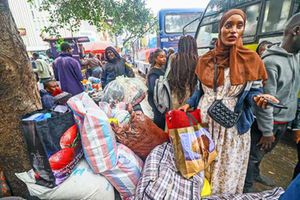US to downplay gay rights during leaders' summit

A sign promoting the US-Africa summit outside the US Department of State in Washington, DC, on July 31, 2014, where President Obama is hosting African leaders. The theme of the Summit is investing in the next generation. PHOTO | AFP
WASHINGTON, DC
The Obama administration's strong support for gay rights in Africa is receiving only passing attention at this week's US-Africa summit in Washington.
The issue is not specifically included on the programme for Wednesday's interchanges between President Obama and many of the 50 African leaders taking part in the summit in Washington.
A State Department official acknowledged in a press briefing on Monday that because of African cultural sensibilities regarding homosexuality, “it can be a difficult and delicate conversation.”
“We are sensitive to that, and at the same time are espousing our viewpoints,” added Steven Feldstein, deputy assistant secretary of state for democracy, human rights and labour.
Secretary of State John Kerry did mention US support for the rights of lesbian, gay, bisexual and transgender (LBGT) individuals in an address to a summit-related civil-society forum on Monday.
NO DIRECT RESPONSE
“We will continue to stand up and speak out for LGBT activists who are working for the day when tolerance and understanding really do conquer hate,” Mr Kerry declared.
But a subsequent question on the topic posed to a panel at the forum drew no direct response.
A questioner from Botswana noted that “a colleague and friend of mine was dismissed out of work because of their gender identity.” What are African governments doing to protect LGBT rights? the Botswanan asked.
Uncomfortable laughter ensued among forum panellists and audience members when the panel's moderator directed the question to President John Mahama of Ghana.
He replied that his own government has the “responsibility to protect the rights of all our citizens, no matter where they come from, their religious orientation, their gender, their ethnic origin.”
RIGHTS OF MONORITY GROUPS
The Ghanaian leader noted that his country enshrines human rights in its constitution, and “if people feel their rights have been trampled against, they are free to go to the human rights court.”
“In Ghana," the president declared, “I really don’t see that kind of oppression.”
A White House fact sheet on US support for human rights distributed at the summit on Monday noted that “the US government stands up for the human rights of LGBT people everywhere.”
The Obama administration cut assistance to Uganda in June in response to the enactment of the Anti-Homosexuality Act, which toughens penalties for persons who engage in same-sex relations.
But the US has yet to react officially to a Ugandan court's ruling last week striking down the law on technical grounds.




